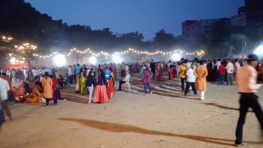
A temple belonging to Hindu community is not a prayer hall, but it is the place of residence of all powerful Bhagavan or Bhagavathi or any other entity that is believed to exist inside the boundary of the temple. A devotee goes to the temple not only to seek blessings but also for a number of other purposes not limited to seeing the aesthetic beauty of the artwork, socialising with other devotees, to participate in the discourses, etc. The nature of the relationship between the devotee and the deity is to be first understood before answering the question about the temple management.
A temple belonging to Hindu community is not a prayer hall, but it is the place of residence of all powerful Bhagavan or Bhagavathi or any other entity that is believed to exist inside the boundary of the temple. A devotee goes to the temple not only to seek blessings but also for a number of other purposes not limited to seeing the aesthetic beauty of the artwork, socialising with other devotees, to participate in the discourses, etc. The nature of the relationship between the devotee and the deity is to be first understood before answering the question about the temple management.
There is an old story about Shri Krishna and Hanuman. Long ago Garuda begins to think that he is the fastest traveller, Sudarshana believes that he is invincible. As the story progresses, Garuda goes to call Hanuman to see Rama in Dwarka. Hanuman flies which such a speed, that Gaurda comes to realize that his speed is no match to the speed of Hanuman. Sudarshana who was guarding Dwarka is unable to stop Hanuman and when Hanuman visits Shri Krishna, Sathyabhama could not take the form of Sita mata which would make Hanuman very happy as Krishna takes the form of Shri Rama. In one small play, Shri Krishna taught a great lesson to many and the great devotee Narada too plays an important role. Narayana Narayana .
When spiritual giants and deities themselves have problems to perform sincere servitude, humans cannot come any where close. Hence, we can say with certainty that there is always a desire to satisfy ones ego by doing greater things. It is for this reason, that we see bigger Ganapathi murthys during the festivities each passing year, grander celebrations and higher donations given at the temples. People want to achieve greatness in service of the Gods and there are others who blast themselves in the name of their gods. We shall not talk about those who blast themselves and kill others for their psychotic behaviour inspired within the four walls of their prayer halls.
The secular government must be the last entity in the universe that should involve in the management of the temple. The government should only manage temple if it satisfies three conditions. The first condition is that the state reclaims all the temples destroyed by those considered as invaders after thorough examination and validation and reclaims the wealth given away to religions which involved in the destruction of the temples in the particular areas. This is an important test for the secular government from the upper caste perspective. Because, if the government want to penalise the so-called upper castes for the alleged crimes committed by their ancestors, then the punishment must be given to all in equal measure.
The second condition is the exclusive declaration that not a single rupee from the consolidated fund of India is spent based on the religion of the citizen either directly or indirectly. A further condition is to bring in the concept for equality in opportunities, laws because government position are the not the only way of empowerment and if it was, then it is working. Most of the alleged caste related issues need local application of stringent laws but the government plays to the gallery and implements global solutions to local problems. Also, if the neo-buddhists and other off-shoots of Hinduism think that they can target Hinduism with fake histories, then they too should be considered as alien religion not withstanding what Ambedkar did or did not do.
The third condition being that the government must pass a law to make the traditions of the temple out of the purview of the judicial interference especially with respect to the matters related to rituals, traditions, practices, etc. If the judiciary thinks that it cannot accept any kind of public interference in its jobs, then on the principle of equality, citizens cannot accept judicial or legislature interference in the matters of their personal life. The constitution which is only a new created can have its faults but it is not the supreme document which can overrule every other custom that predated and followed by those who worked to liberate this land from the invaders. The constitution is only for the common public life and the bigoted principle of equality must exist in the public sphere, where the constitution has failed miserably.
The question is who should manage the temple. The people involved in the day to day working of the temple must manage it. Following are the important categories of the groups of people who are related to the temple:
A1: All the people working in the temple including the priests and other sevayats who are needed for the day to day management of the temple affairs.
A2: The devotees who make frequent visits to the temples at least once each week and on festival days.
A3: The devotees who visit the temples only on special occasions, such as utsava times, festival times, birthdays, or for some family functions, etc.
A4 The regular donors of the temple whose donation amount is less than one week’s overall expenditure. The donors could also be those who give materials to the temple for day to day running of the temple affairs.
A5: Big donors to the temple. Donors could also be those who give materials to the temple for the running of the temple affairs. These people could also be the reason for the construction of the temple
Each of these 5 groups should have a representation and the tourists must have zero say in any decisions related to the temple. These 5 groups of individuals are the reason for the continued existence of the temple. These would be the category A people of the temple.
Then there would be individuals who give regular discourses in the temple, perform some art in the temple premises on a regular basis and other related people who are involved in the propagation of the culture and traditions. These individuals form the second set of individuals who must have some say in the affairs of the temple. These individuals will be category B people of the temple.
Each temple must develop its story based on consensus among category A and B and the reason for the existence of the temple must be built into narrative. The current practices of the temple and the preferred grandeur expected must both be codified because some information needs to be codified so that these issues are not trampled by wokes and pseudo reformers such as our constitutional creatures. If anyone wants to bring in any change, then they have to work with category A and B people and convince them for the need to change only through dialogue. The entry of non-Hindus in the temple property must be prohibited and any offense must be considered as trespassing and insult to the presiding deity and must be punished accordingly in the strictest possible manner.
Any changes to the existing practices must happen when there is sufficient approval from the people related to the temple, i.e., Category A and B. If we say it is 80% vote is needed, then the total vote share for category B people cannot be such that they can always try to stop the change for any reason. In the example, the vote share of category B people cannot be more than 10% which is half of 20% (100% – 80%). Category B could be only the enabler and must not become the controllers of any activity related to the temple.
Among the Category A people, the group A5 are the most important followed by A1, A4, A2 and A3. Any individual could exist in any one the group even if he performs multiple roles in the temple and each individual can have only one vote. A5, A1 could have the same voting power and A4, A2 and A3 could have the equal voting power. If we consider the previous example, 10% votes to Category B people, then Category A people will have a total of 90% votes.
Each sub groups in category can have members each with one vote and no family unit can have more than two members with voting power. The total number of votes is pre-determined and the voting power of each category and sub group must be predetermined based on consensus and working manual for the temple accepted by consensus by a majority of people related to the temple. Elections could be conducted for selecting members for voting and any candidate who won an election can give his voting his right to another person of his choice. Elections to the posts of members with voting rights must be held once in two years or the voting right must shift from Hindu one house to the next Hindu house in a proper order after the first candidate is chosen by lottery or other suitable means.
The biggest issue facing Hinus is the lack of exclusion. Any individual or family working directly or indirectly against the temple activities must be excluded from all activities related to the temple. The voting rights must be taken away after a thorough investigation and discussion conducted in the temple and the decision must be based on consensus or voting by all the significant members. The method for exclusion must be evolved and the conditions considered for the exclusion and quantum of exclusion must all be included in the temple manual. The temple manual itself must be reviewed by all members and be understood by all people related to temple without any confusions.
The financial aspects of the temple must be available to general public and the deities finances must be used in the best possible manner so that the temple could be self-sustaining in the conduct of the various rituals and could support the Hindu community in times of distress. Any facility that is built of the temple funds in part of in full must have the name of the presiding diety alone with due recognition to the significant donors or other icons from the Hindu community. Since the judiciary has taken up on itself the mantle of being the Prophets of Hindu religion, it is important to explicitly tell them that they are not the prophets but only adjudicators in secular aspects and they have failure in their basic duty and kindly request them to mind their crucial duty and not play to the gallery in the name of constitutional morality which they lack in all seriousness.
The Hindu temples on the basis of their financial strength fall into three Categories A, B and C and then there is the fourth Category which is X. Each diety must be provided with a bank account if it is not readily available and then some money must be deposited in it for the day to day expenditure and mostly Category C temples fall into this category. Category A, B temples could sustain themselves and thus where possible these two categories of temples must come in the aid of Category C temples. The temples building franchises must be stopped to uphold the sanctity of the deity and not turn everything into commerce.
The Secular government could not fulfil the three conditions and hence it is important to quit the temple management and leave it to the concerned people. Much reform happened even before the existence of the secular government and only deterioration has happened because of the secular government which turned the sacred placed into tourist destinations. Improving economy is important but at what cost is also an important factor to be kept in mind. Can any citizen straightaway walk into the house of Prime Minister or President? So, what is not good for politicians and judiciary cannot be good for our deities because for Hindus their deities are superior to everyone else.
Author: Vijendra Bhat can be reached on Twitter
Twitter: @SPHEREHEADSAYS




